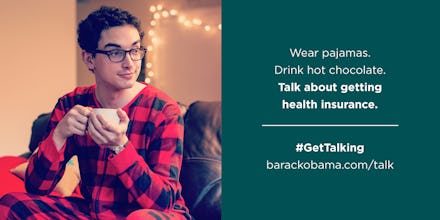This is Pajama Boy. Why is Everyone On Social Media Talking About Him?

The news: Social media is blowing up over the so-called "Pajama Boy," the featured model in a tongue-in-cheek ad promoting the Affordable Care Act:
This strange-yet-milquetoast ad might be a self-aware faux-ironic jab at hipsters, or just a weird attempt at invoking the Christmas spirit. But it's inspired a vitriolic backlash from conservatives on Twitter and in the media, all because right-wingers think he looks kinda gay.
No, really. Take Fox News' The Five host Andrea Tantaros, not-too-subtly implying there's something a little wrong with this guy:
Breitbart writer Kurt Schlichter was a little less subtle:
(Who also went on to call his critics kind of gay, too.)
The Blaze's Dana Loesch does not find him manly enough to screw at all:
And some more from the peanut gallery, not all of which went so far to imply he's gay, just effeminate:
Pajama Boy isn't manly enough to kill "Japs," either:
And aside from the overt homophobia and general deridement of Pajama Boy's masculinity, the right was quick to hate on millennials as well:
Meanwhile, Chris Christie took the time out of drowning over his traffic-ramp scandal to post this much-classier rejoinder to the ad:
So yeah, it's possible to criticize the ad without nakedly displaying all your insecurities. But not if you're at the The National Review, whose editor Rich Lowry called him an "insufferable man-child" and said Pajama Boy's "about as threatening as Michael Cera and so nerdy he could guest-host on an unwatched MSNBC show." It's not clear to me why a model in an ad about healthcare has to be "threatening," but I think it has something to do with the fact that he isn't covered in deer blood and chugging whiskey straight out of the bottle like a real man.
Lowry's Review, by the way, wrote an astonishing four articles bemoaning Pajama Boy, including a truly disgusting one from Charles C. W. Cooke which suggests he's a member of the "Queer Students Association" and talks about "the evils of 'heteronormativity.'" Cooke's piece also laments that Pajama Boy "isn't waiting for PBS to broadcast the boobs and bad language on imported British comedies, as overgrown children once did," because there's nothing that screams "America's most widely read and influential magazine and web site for conservative news, commentary, and opinion" like accusing your opponents of batting for the other team.
That's a lot to take away from a pair of pajamas. After all, you know who else dressed in dorky, comfortable clothes?
Slate's J. Bryan Lowder comments that "What really gets them, apparently, is the fact that there exist young, somewhat bookish-looking men who enjoy being comfortable. At least I think that's what the problem is, based on descriptions like 'infantilized … man-child,' 'metrosexual hipster in a plaid onesie,' and reactions like 'liberals fear masculinity and maturity.'" (He also helpfully notes that if you find your sexuality threatened by a dorky guy in a onesie, you'd be really threatened by some gay men's nighttime adornments.)
While most of us probably found the ad a little silly (and maybe condescending to millennials, like the Florida kegger thrown to keep college students from signing up), it's pretty clear that there was some degree of self-awareness in its formation. Reason's Nick Gillespie, for example, noted that whatever the intent of the original ad, it's clearly successful and "has effectively won the internet for days."
Or maybe not: conservative website Powerline says "President Obama and his minions are nowhere near self-aware enough to engage in that kind of self-deprecation." I guess that settles it.
Last note. For the record, this is what promoting Obamacare to gay guys actually looks like:
Are those enough muscles for you?